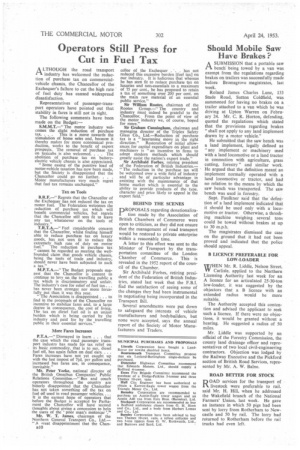Operators Still Press for Cut in Fuel Tax
Page 44

If you've noticed an error in this article please click here to report it so we can fix it.
A LTHOUGH the road transport 1-1 industry has welcomed the reduction of purchase tax on commercialvehicle chassis, the Chancellor of the Exchequer's failure to cut the high rate• of fuel duty has caused widespread dissatisfaction.
Representatives of passenger-transport operators have pointed out that stability in fares is still not in sight.
The following comments have been made on the Budget:—
S.M.M.T.—" The motor industry welcomes the slight reduction of purchase tax. . . . This is a move towards the stimulation of home sales and, because it thereby makes for more economical production, works to the benefit of export prospects. The removal of purchase tax on taxicabs is also welcomed, . . The abolition of purchase tax on batteryelectric vehicle chassis is also appreciated.
"Some easing of the punitive load of motor-vehicle taxation has now been made, but the Society is disappointed that the Chancellor could go no further. . . . Motor manufacturers very much regret that fuel tax remains unchanged."
Tax on Tools Regrets that the Chancellor of the Exchequer has not reduced the tax on motor fuel. The Federation welcomes the reduction of purchase tax which will benefit commercial vehicles, but regrets that the Chancellor still sees fit to leave any tax whatsoever on the tools of industry."
T.R.T.A.—" Feel considerable concern that the Chancellor, whilst finding himself able to reduce purchase tax on luxury goods, has not seen fit to reduce the extremely high rate of duty on motor fuel." The reduction in purchase tax "cannot be regarded as meeting the wellfounded claim that goods vehicle chassis, being the tools of trade and industry, should never have been subjected to such a tax."
M.P.T.A.—" The Budget proposals suggest that the Chancellor is content to continue to levy on the travelling public a tax which is discriminatory and unfair. The industry's case for relief of fuel tax ... has never been stronger nor more forcefully put than it was this year. "The Association is disappointed . .. to find in the proposals of the Chancellor no incentive to stabilize fares and, to a large degree in consequence, the cost of living. The tax on diesel fuel oil is an unjust burden which is being carried by the industry and paid for by the travelling public in their essential services."
More Fares Increases
P.T.A.—" Dismayed to learn . . that the case which the road passenger transport industry has made for tax relief on its basic commodity, that is to say, diesel fuel oil, has again fallen on deaf ears. . . . Fares increases have not yet caught up with the last impost of ?id. per gallon and increased bus fares are, in consequence, inevitable."
Mr. Peter Yorke, national director of the British Omnibus Companies' Public Relations Committee.—" Bus and coach operators throughout the country are bitterly disappointed that the Chancellor has not taken something off the tax on fuel oil used in road passenger vehicles.. It is the earnest hope of operators that before the Budget is accepted by Parliament the Chancellor will have second thoughts about giving a concession to help the users of the • poor man's motorcar '."
Mr. W. T. James, chairman of the Northern General Transport Co., Ltd.— " A 7reat disappointment that the Chan
is I 0
cellor of the Exchequer . . . has not reduced this excessive burden [fuel tax] on our industry. It is ludicrous that whereas he has seen fit to reduce purchase tax on luxuries and non-essentials to a maximum of 75 per cent., he has proposed to retain a tax of something over 200 per cent, on the main raw material of an essential public service."
Sir William Rootes, chairman of the Rootes Group.—" The country and industry must indeed be grateful to the Chancellor. From the point of view of the motor industry we, of course, hoped for more."
Sir Graham Cunningham, chairman and managing director of the Triplex Safety Glass Co., Ltd.—Reduction of purchase tax is a "heartening move in the right direction." Restoration of initial allowances for capital expenditure on plant and machinery is "an incentive to firms to adopt modem methods which should greatly assist the nation's export trade." Sir Archibald Forbes, retiring president of the Federation of British Industries.— " The reduction in the purchase tax will be welcomed over a wide field of industry and will be of particular advantage in assisting with the maintenance of that home market which is essential to the ability to provide products of the type, character and price likely to appeal in the export field,"
BEHIND THE SCENES
PROPOSALS regarding denationalization made by the Association of British Chambers of Commerce were open to criticism, as they did not ensure that the management of road transport would be restored to private enterprise within a reasonable time.
A letter to this effect was sent to the Minister of Transport by the transportation committee of the London Chamber of Commerce. This is revealed in the 1952 report of the council of the Chamber.
Sir Archibald Forbes, retiring president of the Federation of British Industries, stated last week that the F.B.I. Had the satisfaction of seeing some of the changes they had been instrumental in negotiating being incorporated in the Transport Bill.
Several amendments were put down to safeguard the interests of vehicle manufacturers and bodybuilders, but none were accepted, says the annual report of the Society of Motor Manufacturers and Traders.




































































































